1 - Expected post-Chinafy results
How should the tourism industry prepare for China opening up again in 2024?
China is opening borders for outbound and inbound travellers in 2023, In this article, we will -
1. Give you a framework to analyse your hotel's website performance
2. Provide examples on how agencies and Chinafy would evaluate a hotel website
3. Share real-world outcomes of hotel websites with Chinafy, like Swire Hotels' House Collective
4. Calculate the negative impact of a non-performative website on revenue. You can jump to the full-length article on "Cost of Incompatibility and not booking direct" here.
China Travel Trends in 2023
Outbound tourism is expected to recover in 2023: China's National Health Commission announced that inbound travellers would no longer require quarantine starting on Jan 8, making cross-border travels easier for both returnees and visitors.
According to data from online travel agency Trip.com Group, searches for international flights to China shot up 351% year-over-year following the release of the new border policies China.
China will be a major growth driver in the tourism industry: China was the world's largest outbound tourism market before COVID shut down global travel, with its overseas visitors spending $127.5 billion on travel in 2019.
With every country varying in its openness towards welcoming visitors from abroad - professionals in this industry are faced with the continued challenge of adapting to evolving circumstances.
One of these biggest developments is how likely China - as one of the biggest exports of tourists - will be one of the first countries to send tourists your way.
With this in mind...
How (digitally) prepared are hotels for Chinese tourists?
There are three key variables that you can use to quickly assess a hotel website for web performance and user experience. We’ll use these variables to determine a site’s “preparedness” and walk you through some examples below.
Speed: defined by metrics like i) time to fully load a single page and ii) how long it takes to visually complete a page.
Check-out Experience: How smooth is the check-out or booking process?
Media: How accessible are key media sections, including both videos and photos?
Submit your website for a free initial assessment of your hotel site
How fast (or slow) is the “average” hotel website in China?
In a sample of 68 hotels, the average hotel website takes 26.75 secs to load from China versus 5.03 seconds from the US.
This means that on average:
The same hotel websites load 5.4x slower in China, than it does when loaded from the U.S. Worse yet, only 65% of their website resources are delivered into China, which visitors only see if they stay on the same page 25 secs into the loading experience.
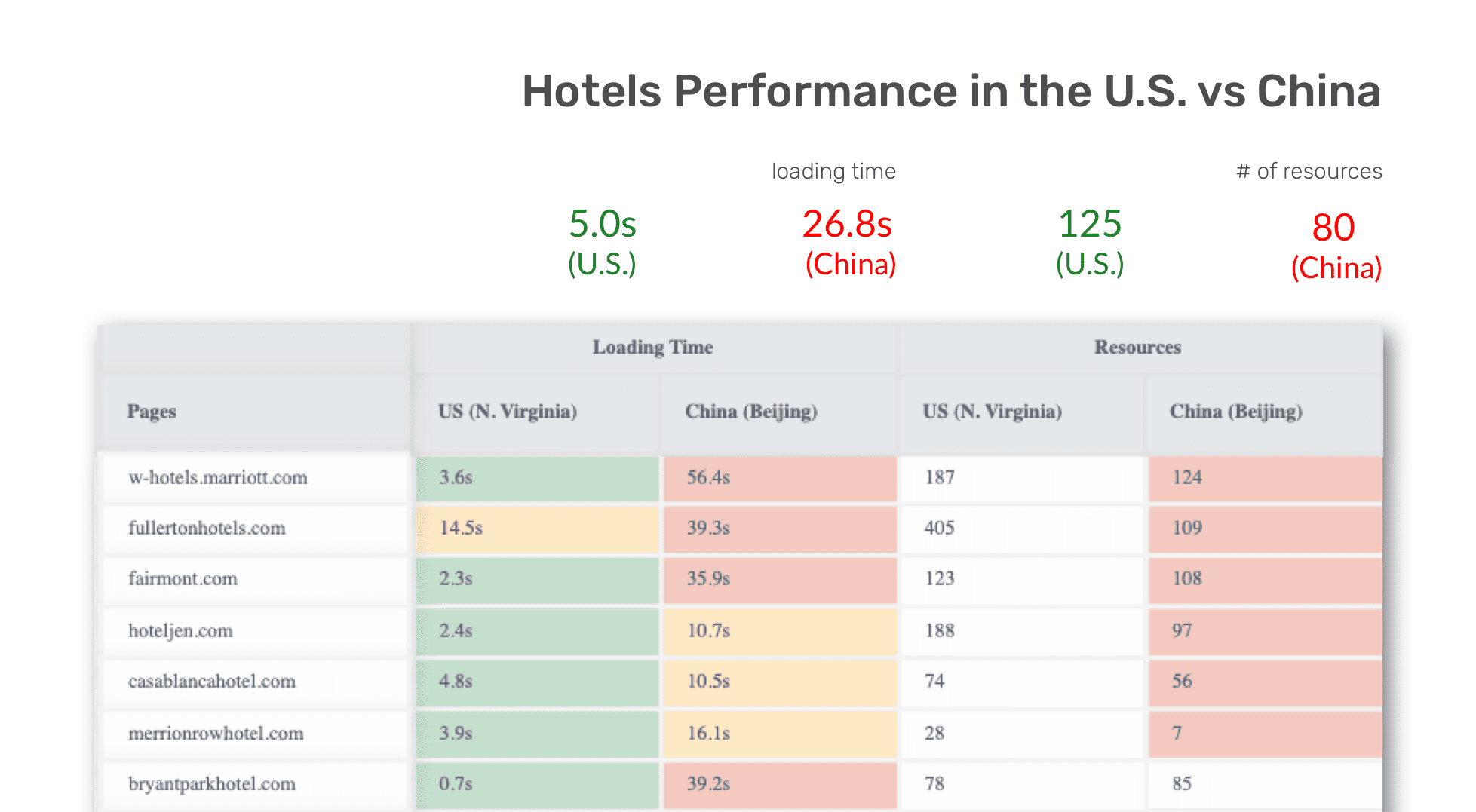
Table: Performance comparisons of hotel websites in China
In contrast, an optimised hotel websites like Swire Hotels in China take ~3 secs to be reliably loaded in China.
So, what's the speed difference between an non-optimized website and an optimised hotel website in China? Almost 10x.
Reach out to info@chinafy.com to compare your hotel website or add it to our China Website Performance List.
While larger brands may be assumed to have more resources, strong website performance is brand agnostic.
To see how you might analyze a site in practice, let's walk through how one would assess Disneyland Hotels in Hong Kong and Peninsula Hotels.
Disneyland Hotels: 105.53 secs to fully load in China
Marking the early start of Disney's legacy in China, Hong Kong Disneyland is the oldest Disneyland park in China with its fair share of Mainland visitors. Some of them choose to stay at its on-site hotels for the full magical experience.
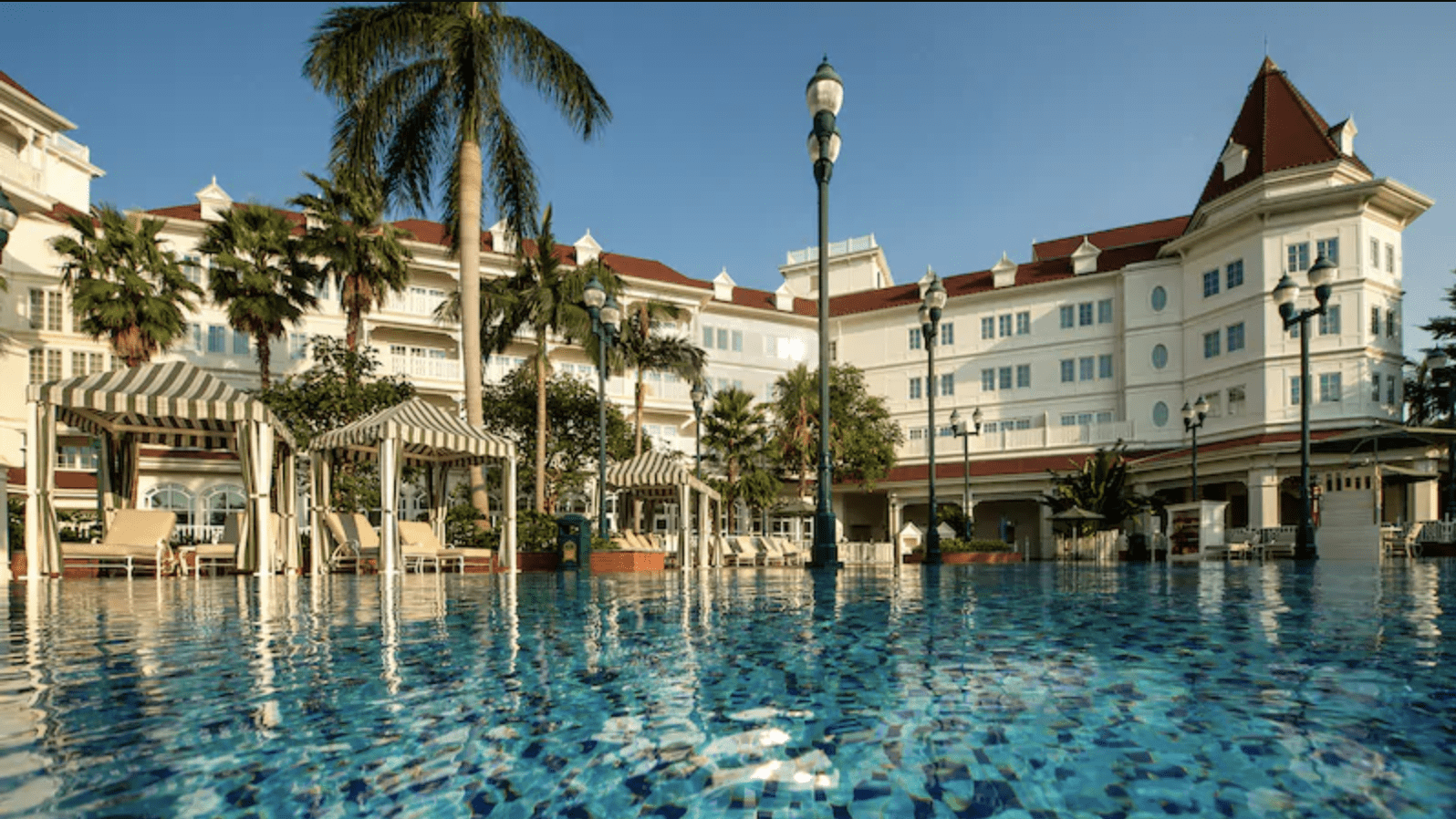
Source: Hong Kong Disneyland
Unfortunately, the hotel booking site takes up to 105s to load in parts of China, sending Chinese tourists off to a not-so-smooth start.
How does 105s compare with the rest of the world? Take a look at the below global speed test:
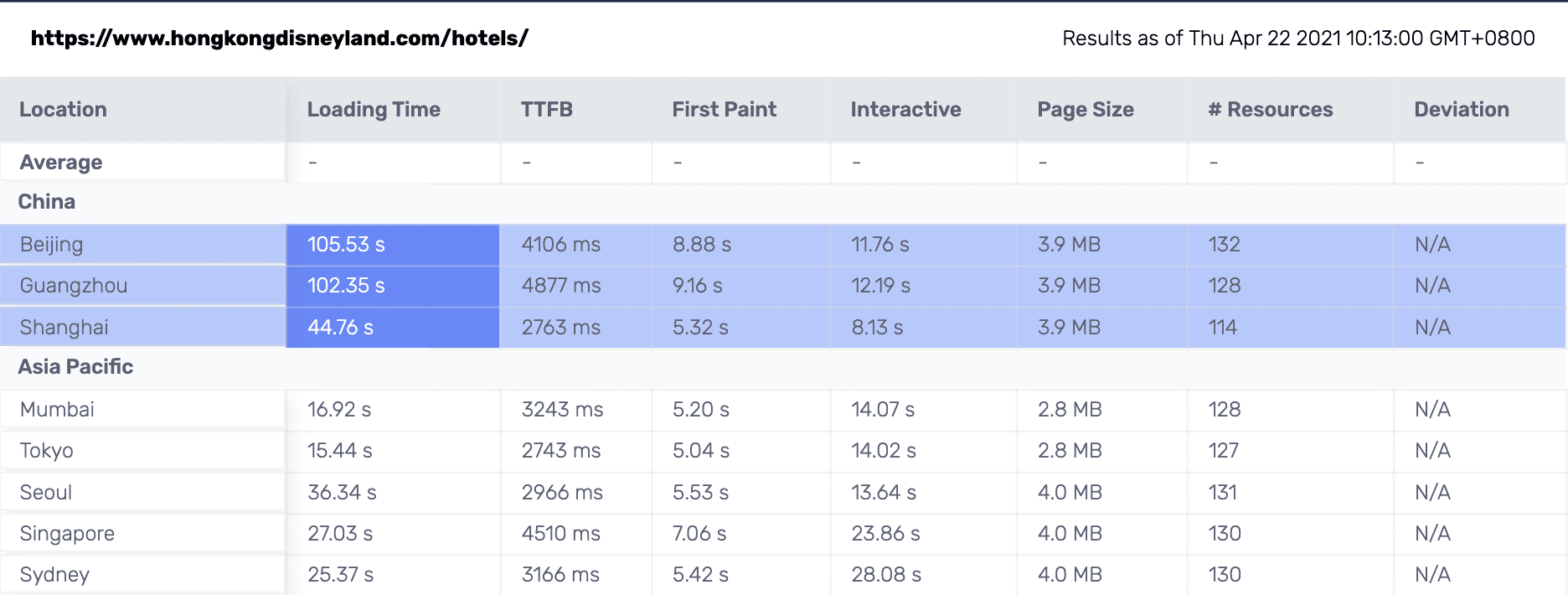
In relative terms, its performance in China is 8x slower than the rest of the APAC region.
Not only is the website slow in China, but it’s also missing resources in China.
As seen below, the Disneyland homepage itself is missing 18% of its visual assets in China.

What do "missing resources" entail? Well, this is how the website appears to Mainland visitors
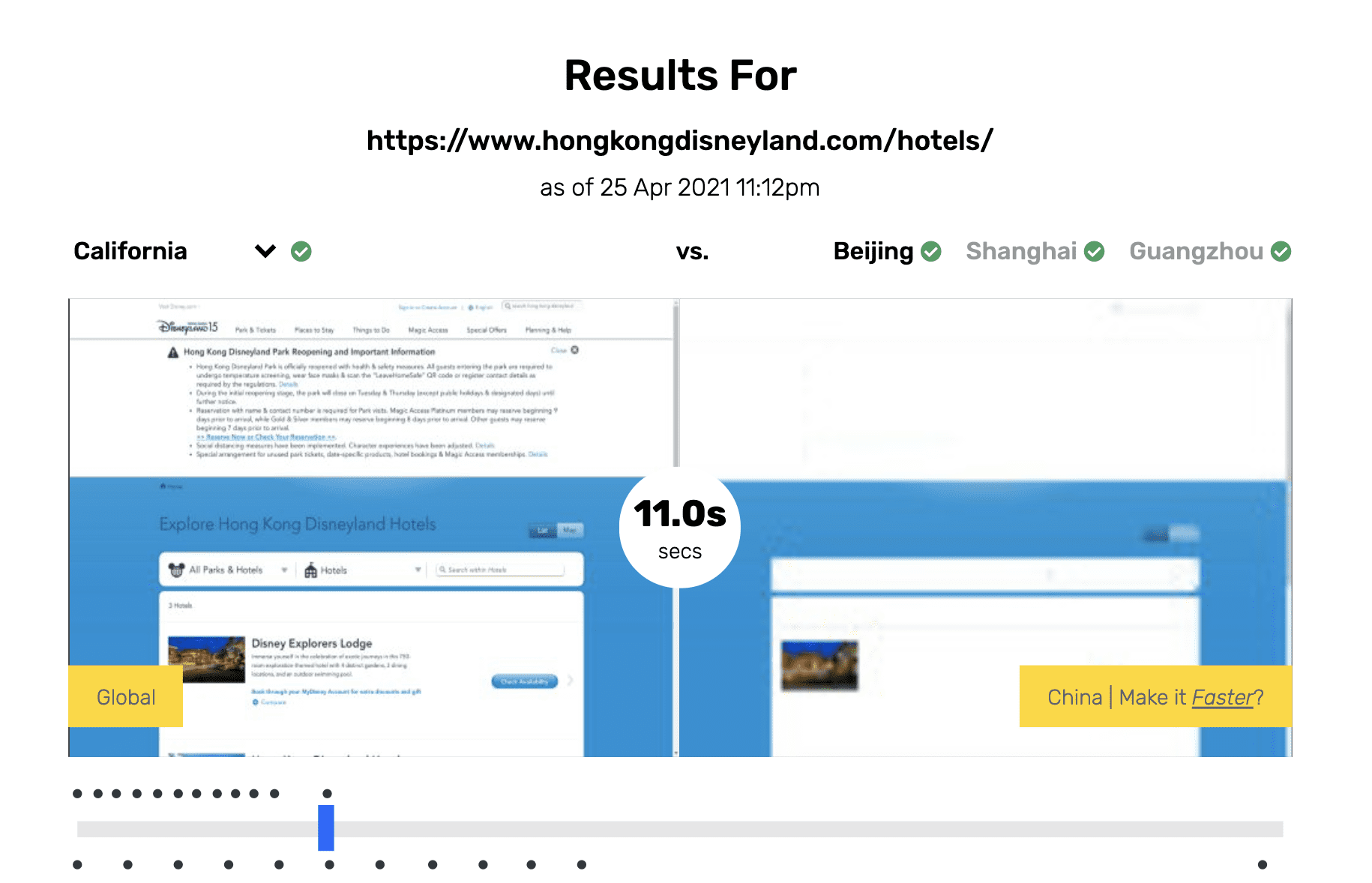
Looks broken to you? Same here…
Peninsula Hotels: loading in 96.95s, if not ‘timing out’ in parts of China
On the other end of the luxury spectrum are the Peninsula Hotels - a leading luxury five-star hotel brand attracting visitors globally with its legacy, classic luxuries, and top-notch service.

Source: The Peninsula Hong Kong
Unfortunately, the Peninsula Hotels website takes close to 100s to load in China if not ‘timing out’ in parts of China as illustrated below.
The beautiful booking website is also 9x slower in China than the rest of the APAC region.
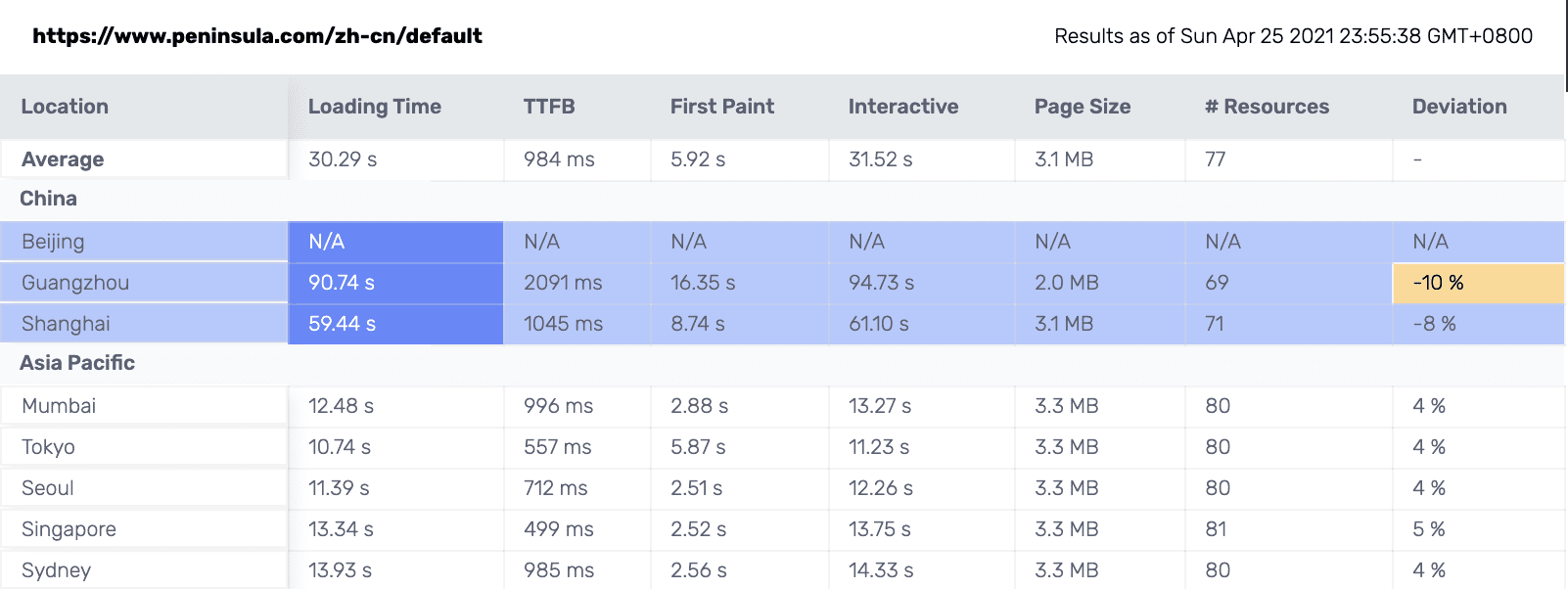
Interestingly, the Peninsula Hotels website is ICP-registered as are other onshore-hosted websites*. In spite of that, the website still faces code-based incompatibility issues that remain unresolved.
*ICP refers to the Internet Content Provider certification, which is a permit that allows you to host your website on a mainland Chinese server.
Can an ICP fix slow websites in China? Read our full guide on ICP and website compatibility in China.
Visually, this is how the Peninsula Hotels website looks from China.
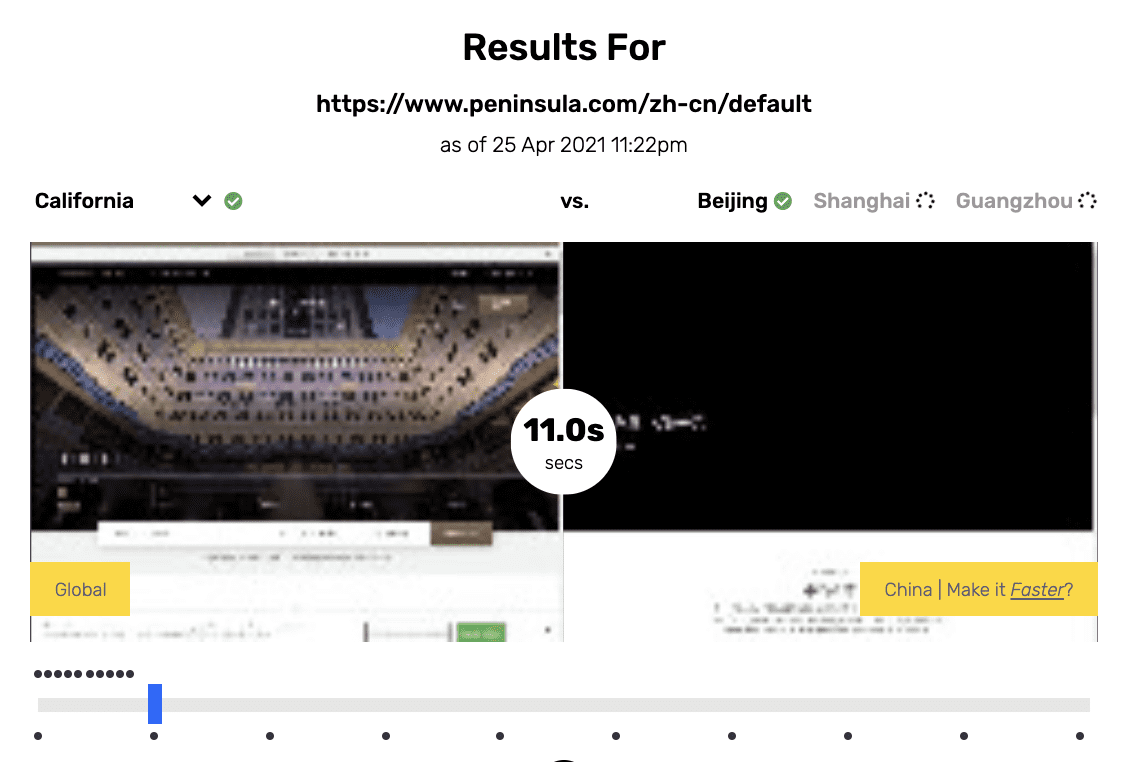
Check-out Experience
In addition to speed and related deliverability issues, the Peninsula Hotels global website also face friction in its check-out experience.
The two most used digital wallets in China are WeChat Pay and Alipay with an active user base of 800 million and 1.3 billion, respectively.
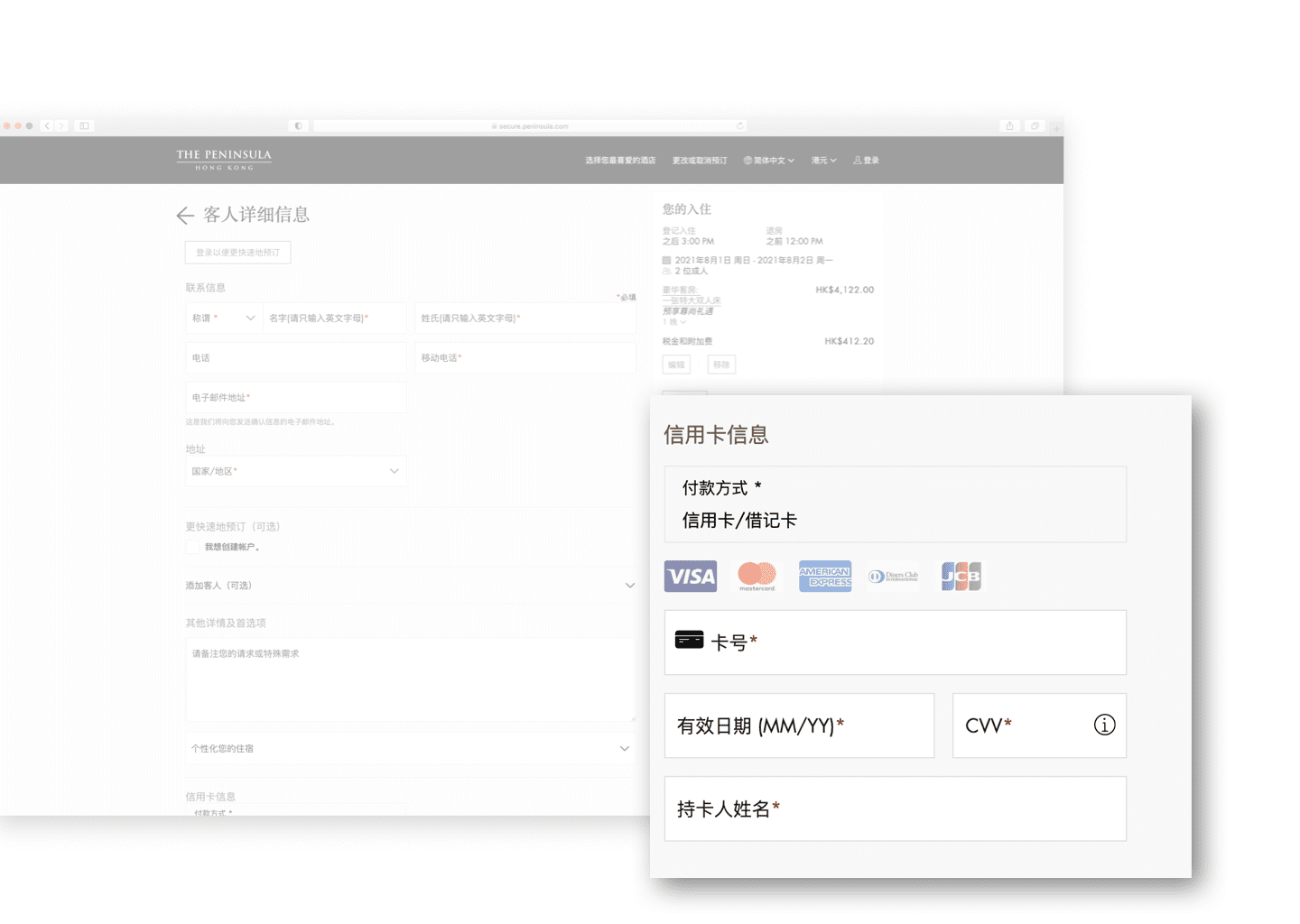
Check-out page on the Peninsula Hotels website.
Unfortunately, the checkout page on Peninsula Hotels doesn’t support WeChat Pay and Alipay as of the date of this article.
This when coupled with speed-related issues, is a friction point potentially sending visitors away to third-party booking platforms that do.
Now, here comes the next question...
How much does a slow website cost a business?
Short answer: A noteworthy amount.
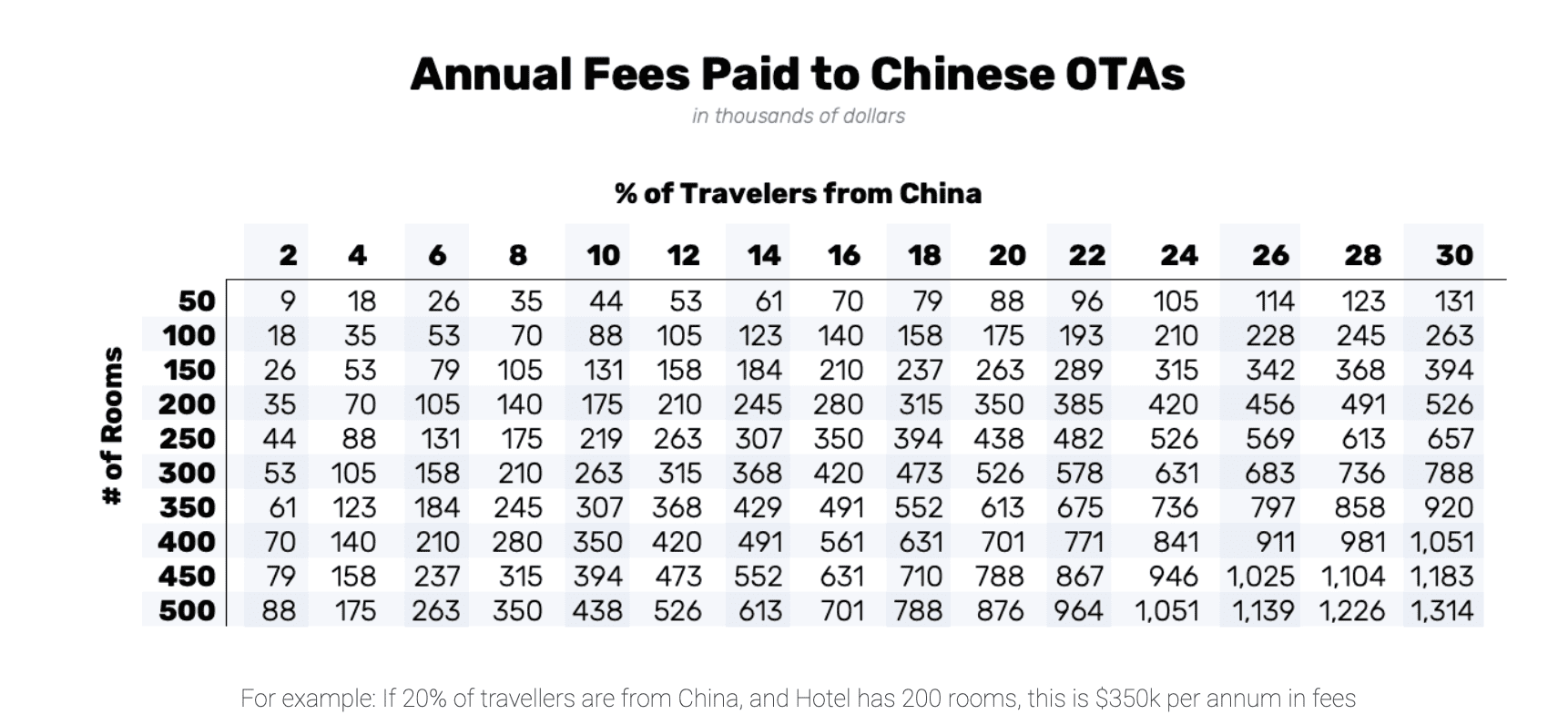
"The cost of incompatibility and not booking direct" Source: Chinafy
There are indeed alternative ways to booking hotels (i.e. one could simply call a hotel - on the phone, and book a room although rare nowadays) but it's important to take into account the key assumptions above which are that many Chinese travellers who cannot book directly on your website, therefore, would be encouraged to book their stays with Chinese OTAs like Ctrip and Fliggy.
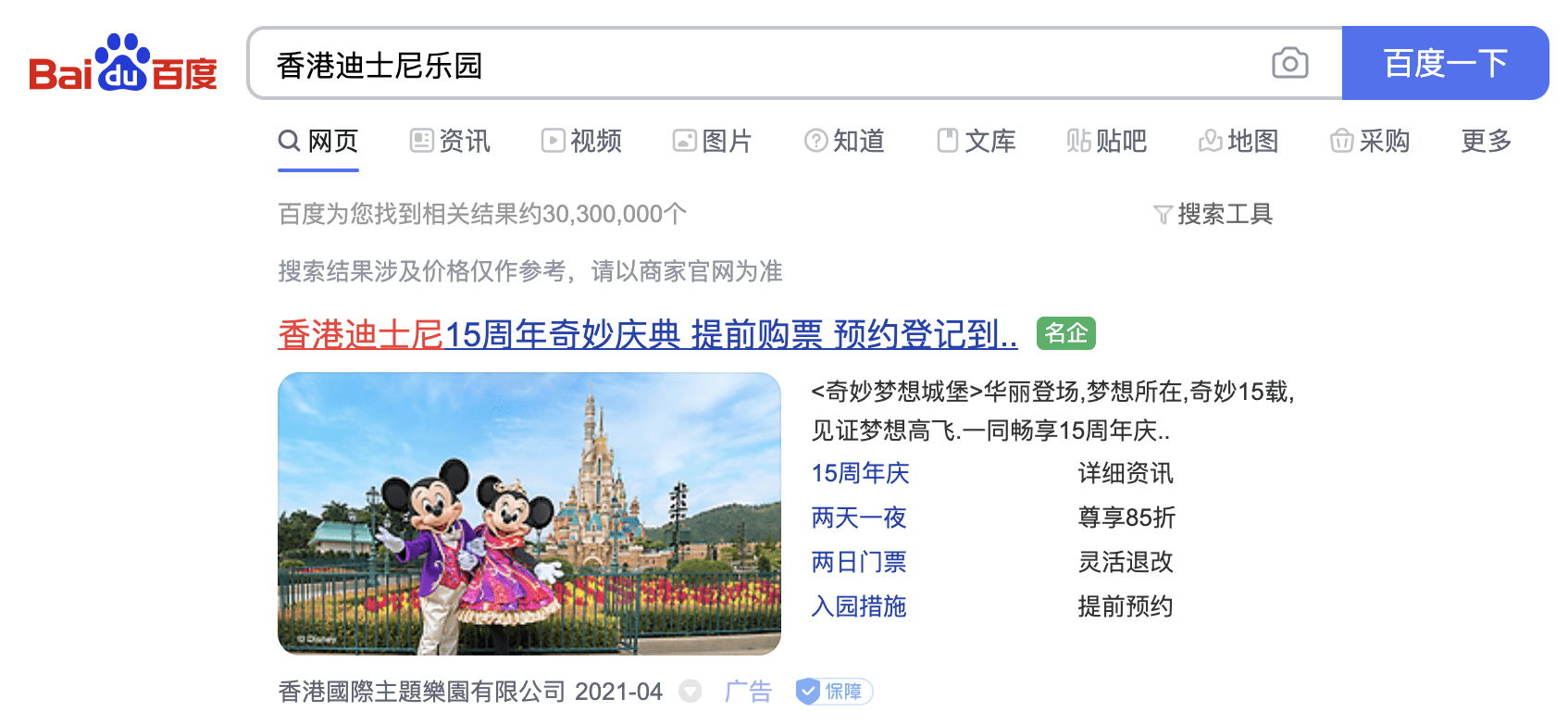
As of 2021, Hong Kong Disneyland is actively running a paid marketing campaign on Baidu.
More on this in: “What's the Cost of Incompatibility and Not Booking Direct?”
Make your hotel website work in China, fast.
Now, before you get your developers to "fix your site", you should know that there are also various ways to make a website load fast and fully in China:
In-house: Hire a team with expert headcount to build, host, and localise your website in China. Note that this would require onshore operations and specific China-expertise with months of development OR
Chinafy: Simply use Chinafy to achieve virtually onshore performance on an ongoing basis. This doesn't affect your global website, and reduces the optimisation process from months (or years) into just weeks.
Chinafy works by re-engineering a China-friendly version of your website, combining its proprietary intelligent resource technology and best-in-class near China CDNs..
To date, it is the only platform able to achieve virtually onshore performance, offshore. For companies with the requisite onshore licenses, Chinafy has other solutions to improve performance to maximise that onshore digital presence.
Want to see the Chinafy process in action?
Read more in this case study where you’ll see how The House Collective by Swire Hotels is 2.2x faster in China than outside of China, after Chinafy.
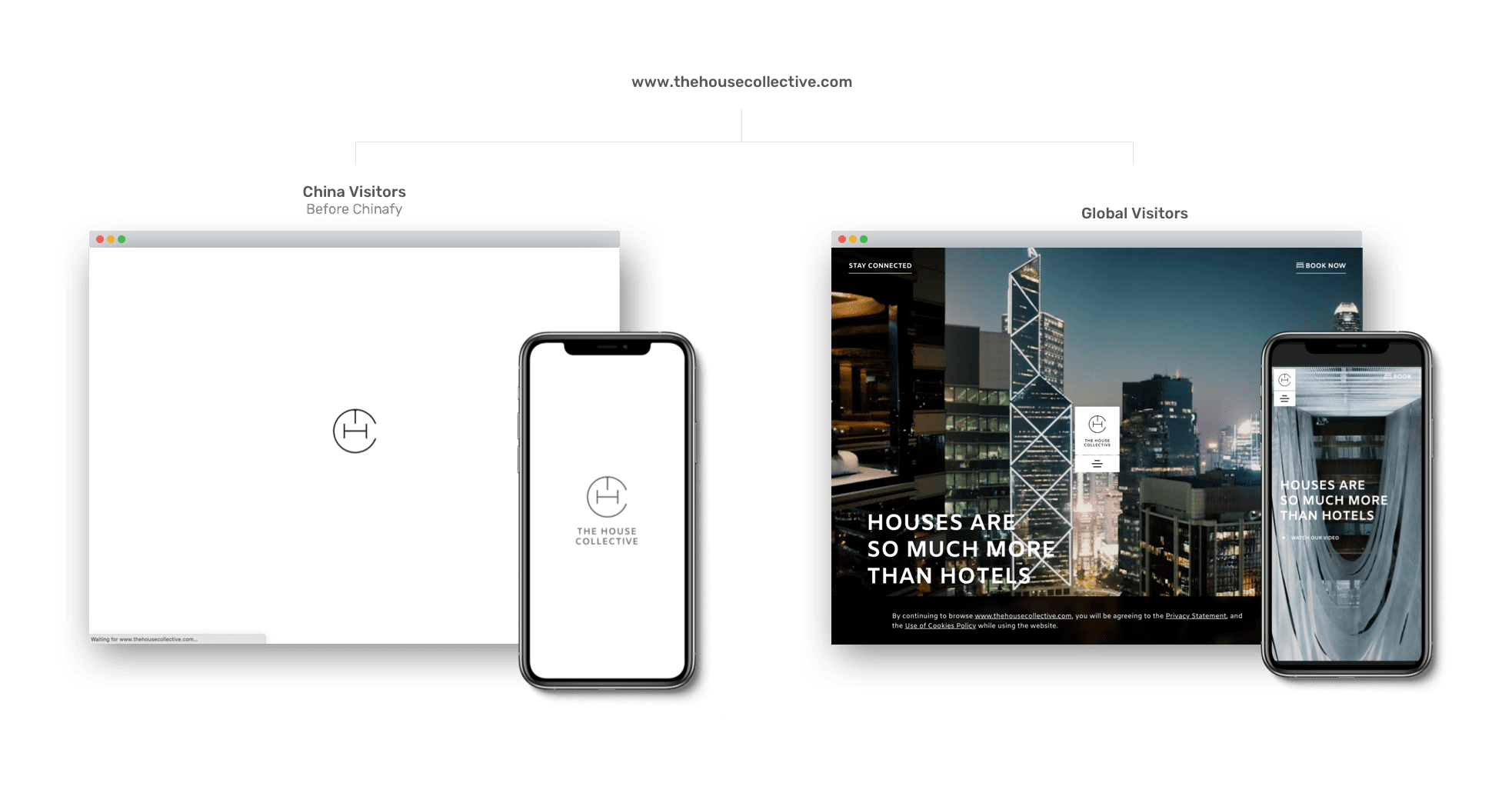
Swire House Collective Before & After Chinafy
Some final thoughts...
Hotels both inside and outside of China are realizing the importance of strong website performance in China - if they haven't already - with expected market recovery just around the corner.
Does this apply to your website?
Reach out to us to receive a free website performance assessment of your site in China.
All you have to do is to click Get Started to get in touch.



1 - Expected post-Chinafy results






























